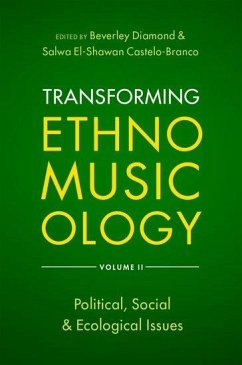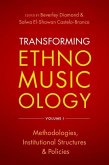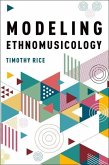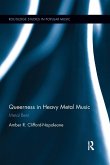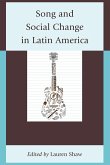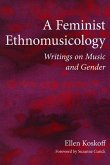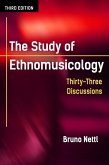Transforming Ethnomusicology Volume II
Political, Social & Ecological Issues
Herausgeber: Diamond, Beverley; Castelo-Branco, Salwa El-Shawan
Transforming Ethnomusicology Volume II
Political, Social & Ecological Issues
Herausgeber: Diamond, Beverley; Castelo-Branco, Salwa El-Shawan
- Broschiertes Buch
- Merkliste
- Auf die Merkliste
- Bewerten Bewerten
- Teilen
- Produkt teilen
- Produkterinnerung
- Produkterinnerung
This two-volume collection transforms our understanding of the discipline of ethnomusicology by exploring how ethnomusicologists can contribute to positive social and environmental change within institutional frameworks. The second volume focuses on the intersection of ecological and social issues and features a variety of Indigenous perspectives
Andere Kunden interessierten sich auch für
![Transforming Ethnomusicology Volume I Transforming Ethnomusicology Volume I]() Transforming Ethnomusicology Volume I52,99 €
Transforming Ethnomusicology Volume I52,99 €![Music Theory in Ethnomusicology Music Theory in Ethnomusicology]() Stephen Blum (Professor Emeritus of Mu Professor Emeritus of MusicMusic Theory in Ethnomusicology28,99 €
Stephen Blum (Professor Emeritus of Mu Professor Emeritus of MusicMusic Theory in Ethnomusicology28,99 €![MODELING ETHNOMUSICOLOGY P MODELING ETHNOMUSICOLOGY P]() Timothy Rice (Professor, Professor, UCLA)MODELING ETHNOMUSICOLOGY P32,99 €
Timothy Rice (Professor, Professor, UCLA)MODELING ETHNOMUSICOLOGY P32,99 €![Queerness in Heavy Metal Music Queerness in Heavy Metal Music]() Amber R. Clifford-NapoleoneQueerness in Heavy Metal Music72,99 €
Amber R. Clifford-NapoleoneQueerness in Heavy Metal Music72,99 €![Song and Social Change in Latin America Song and Social Change in Latin America]() Song and Social Change in Latin America68,99 €
Song and Social Change in Latin America68,99 €![A Feminist Ethnomusicology A Feminist Ethnomusicology]() Ellen KoskoffA Feminist Ethnomusicology37,99 €
Ellen KoskoffA Feminist Ethnomusicology37,99 €![The Study of Ethnomusicology The Study of Ethnomusicology]() Bruno NettlThe Study of Ethnomusicology27,99 €
Bruno NettlThe Study of Ethnomusicology27,99 €-
-
-
This two-volume collection transforms our understanding of the discipline of ethnomusicology by exploring how ethnomusicologists can contribute to positive social and environmental change within institutional frameworks. The second volume focuses on the intersection of ecological and social issues and features a variety of Indigenous perspectives
Hinweis: Dieser Artikel kann nur an eine deutsche Lieferadresse ausgeliefert werden.
Hinweis: Dieser Artikel kann nur an eine deutsche Lieferadresse ausgeliefert werden.
Produktdetails
- Produktdetails
- Verlag: Oxford University Press Inc
- Seitenzahl: 270
- Erscheinungstermin: 30. September 2021
- Englisch
- Abmessung: 234mm x 153mm x 18mm
- Gewicht: 400g
- ISBN-13: 9780197517567
- ISBN-10: 0197517560
- Artikelnr.: 60175487
- Herstellerkennzeichnung
- Libri GmbH
- Europaallee 1
- 36244 Bad Hersfeld
- gpsr@libri.de
- Verlag: Oxford University Press Inc
- Seitenzahl: 270
- Erscheinungstermin: 30. September 2021
- Englisch
- Abmessung: 234mm x 153mm x 18mm
- Gewicht: 400g
- ISBN-13: 9780197517567
- ISBN-10: 0197517560
- Artikelnr.: 60175487
- Herstellerkennzeichnung
- Libri GmbH
- Europaallee 1
- 36244 Bad Hersfeld
- gpsr@libri.de
Beverley Diamond is Professor Emerita at Memorial University of Newfoundland where she served as the first Canada Research Chair in Ethnomusicology and founded and directed the Research Centre for the Study of Music, Media, and Place (MMaP) from 2003-15. Diamond is known for her feminist music research and her work on Canadian cultural historiography and Indigenous music cultures in North America and Scandinavia. Salwa El-Shawan Castelo-Branco is Professor of Ethnomusicology at the Faculty of Social Sciences and Humanities of the Nova University of Lisbon, Portugal, where she founded and directs the Ethnomusicology Institute - Center for the Study of Music and Dance (INET-md). Her publications focus on cultural politics, musical nationalism, identity, music media, modernity, heritagization, and music and conflict in Portugal, Egypt, and Oman.
* Ethnomusicological Praxis: An Introduction
* Beverley Diamond and Salwa El-Shawan Castelo-Branco
* Chapter 1: A Sound Economy
* Jeff Todd Titon
* Chapter 2: Music for Global Human Development
* Michael Frishkopf
* Chapter 3: Reengaging Sound Praxis in the Real World:
Politico-Epistemological Dimensions of Dialogue and Participation in
Knowledge Production
* Samuel Araujo
* Chapter 4: Silenced Registers of Ethnomusicological Academic Labor
under Neoliberalism
* Ana Hofman
* Chapter 5: Sonic Mapping and Critical Citizenship: Reflections on
LimerickSoundscapes
* Aileen Dillane and Tony Langlois
* Chapter 6: The Earth Is (Still) Our Mother: Traversing Indigenous
Landscapes through Sacred Geographies of Song
* Chad Hamill
* Chapter 7: The Modernity of the Songlines
* Rhoda Roberts
* Chapter 8: Music Endangerment, Repatriation and Intercultural
Collaboration in an Australian Discomfort Zone
* Sally Treloyn and Rona Goonginda Charles
* Chapter 9: Dancing Domba: Intersections of Ethnomusicology, Music
Education, and Research with Children and Young People
* Andrea Emberly and Mudzunga Junniah Davhula
* Chapter 10: Ethical Friction: IRBs, Ethnolmusicological Ethics, and
Music in an American Jail
* Andy McGraw
* Chapter 11: Ethnomusicology and the Meeting of Knowledges in Music:
The Inclusion of Masters of Traditional Musics as Lecturers in Higher
Education Institutions
* José Jorge de Carvalho
* Beverley Diamond and Salwa El-Shawan Castelo-Branco
* Chapter 1: A Sound Economy
* Jeff Todd Titon
* Chapter 2: Music for Global Human Development
* Michael Frishkopf
* Chapter 3: Reengaging Sound Praxis in the Real World:
Politico-Epistemological Dimensions of Dialogue and Participation in
Knowledge Production
* Samuel Araujo
* Chapter 4: Silenced Registers of Ethnomusicological Academic Labor
under Neoliberalism
* Ana Hofman
* Chapter 5: Sonic Mapping and Critical Citizenship: Reflections on
LimerickSoundscapes
* Aileen Dillane and Tony Langlois
* Chapter 6: The Earth Is (Still) Our Mother: Traversing Indigenous
Landscapes through Sacred Geographies of Song
* Chad Hamill
* Chapter 7: The Modernity of the Songlines
* Rhoda Roberts
* Chapter 8: Music Endangerment, Repatriation and Intercultural
Collaboration in an Australian Discomfort Zone
* Sally Treloyn and Rona Goonginda Charles
* Chapter 9: Dancing Domba: Intersections of Ethnomusicology, Music
Education, and Research with Children and Young People
* Andrea Emberly and Mudzunga Junniah Davhula
* Chapter 10: Ethical Friction: IRBs, Ethnolmusicological Ethics, and
Music in an American Jail
* Andy McGraw
* Chapter 11: Ethnomusicology and the Meeting of Knowledges in Music:
The Inclusion of Masters of Traditional Musics as Lecturers in Higher
Education Institutions
* José Jorge de Carvalho
* Ethnomusicological Praxis: An Introduction
* Beverley Diamond and Salwa El-Shawan Castelo-Branco
* Chapter 1: A Sound Economy
* Jeff Todd Titon
* Chapter 2: Music for Global Human Development
* Michael Frishkopf
* Chapter 3: Reengaging Sound Praxis in the Real World:
Politico-Epistemological Dimensions of Dialogue and Participation in
Knowledge Production
* Samuel Araujo
* Chapter 4: Silenced Registers of Ethnomusicological Academic Labor
under Neoliberalism
* Ana Hofman
* Chapter 5: Sonic Mapping and Critical Citizenship: Reflections on
LimerickSoundscapes
* Aileen Dillane and Tony Langlois
* Chapter 6: The Earth Is (Still) Our Mother: Traversing Indigenous
Landscapes through Sacred Geographies of Song
* Chad Hamill
* Chapter 7: The Modernity of the Songlines
* Rhoda Roberts
* Chapter 8: Music Endangerment, Repatriation and Intercultural
Collaboration in an Australian Discomfort Zone
* Sally Treloyn and Rona Goonginda Charles
* Chapter 9: Dancing Domba: Intersections of Ethnomusicology, Music
Education, and Research with Children and Young People
* Andrea Emberly and Mudzunga Junniah Davhula
* Chapter 10: Ethical Friction: IRBs, Ethnolmusicological Ethics, and
Music in an American Jail
* Andy McGraw
* Chapter 11: Ethnomusicology and the Meeting of Knowledges in Music:
The Inclusion of Masters of Traditional Musics as Lecturers in Higher
Education Institutions
* José Jorge de Carvalho
* Beverley Diamond and Salwa El-Shawan Castelo-Branco
* Chapter 1: A Sound Economy
* Jeff Todd Titon
* Chapter 2: Music for Global Human Development
* Michael Frishkopf
* Chapter 3: Reengaging Sound Praxis in the Real World:
Politico-Epistemological Dimensions of Dialogue and Participation in
Knowledge Production
* Samuel Araujo
* Chapter 4: Silenced Registers of Ethnomusicological Academic Labor
under Neoliberalism
* Ana Hofman
* Chapter 5: Sonic Mapping and Critical Citizenship: Reflections on
LimerickSoundscapes
* Aileen Dillane and Tony Langlois
* Chapter 6: The Earth Is (Still) Our Mother: Traversing Indigenous
Landscapes through Sacred Geographies of Song
* Chad Hamill
* Chapter 7: The Modernity of the Songlines
* Rhoda Roberts
* Chapter 8: Music Endangerment, Repatriation and Intercultural
Collaboration in an Australian Discomfort Zone
* Sally Treloyn and Rona Goonginda Charles
* Chapter 9: Dancing Domba: Intersections of Ethnomusicology, Music
Education, and Research with Children and Young People
* Andrea Emberly and Mudzunga Junniah Davhula
* Chapter 10: Ethical Friction: IRBs, Ethnolmusicological Ethics, and
Music in an American Jail
* Andy McGraw
* Chapter 11: Ethnomusicology and the Meeting of Knowledges in Music:
The Inclusion of Masters of Traditional Musics as Lecturers in Higher
Education Institutions
* José Jorge de Carvalho

